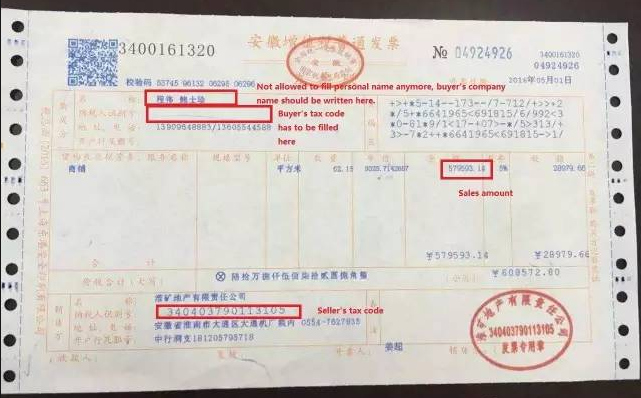China fapiao are tax invoices which are commonly provided to customers upon purchasing a product or service.
They are both proof of purchase, and proof that tax has been paid.
As China continues to tighten its control on how businesses and individuals conduct their tax affairs, it is no surprise that they have now brought in new rules from July 1st 2017 to control fapiaos more strictly.
Why Change China Fapiao Rules?
Under the old fapiao system the fapiao (receipt) just needed to include the legal business name. Therefore you can imagine that it may be open to abuses, such as adding the incorrect financial transaction amount and receiving part payment 'under-the-table,' or paying a 3rd party company for the use of its fapiao (negating the need to register for tax).
The plan is for VAT collection to be more streamlined and transparent, avoiding any practices that undermine taxation.
What's new?
Fapiao will still require the company's legally registered business name, but they now must include a lot more information.
- Legally registered company name
- Company fapiao chop (stamp) - specific to these receipts
- Tax ID or unified social credit code of issuing company
- Correct transaction information including product/service description and price
- Company address, telephone number, and bank account details
In addition, vendors will be required to add their fapiao information into the State Administration of Taxation (SAT)'s VAT system, meaning that the individual fapiao issued, and the information on system must be consistent in order for the vendor not to be in breach of taxation rules.
If this is not followed, fapiao will not be valid and cannot be used to prove purchase or to claim back tax as business expenses for companies or individuals.
Here is an example of a correctly filled 'new' fapiao:

Image courtesy of guideinchina
The changes also affect the recipients of China fapiao too.
When using a fapiao to claim for expenses, only a fapiao which is marked as being for a certain purpose can be used to claim that kind of expense - for example, to claim back tax on stationary, the fapiao/s used must be for the stationary. In the past, any fapiao could often be used to claim back expenses as long as the amounts being claimed were correct. It would not be uncommon, for example, to collect restaurant fapiao and then use these to claim back other business expenses.
Does this affect foreign businesses in China?
Yes, of course.
If your business, let's say for example a WFOE, is selling goods in China then you will/should already be issuing fapiao to your customers. Now you need to make sure that your accountant (regardless of whether they are in-house or third party accountants) is following these additional rules correctly in order for you to remain compliant with the SAT.
If your company has been correctly set up and you are following the rules as of now, then adding the extra information onto fapiao shouldn't be too hard. It is worthwhile, as it will keep you in good standing with local authorities who can see that you have been following tax rules related to VAT.
You should also know that when you're dealing with Chinese vendors, if they don't follow these new China fapiao rules they may be jeopardising your business, as the 'receipt' that you think you have will in fact be a worthless piece of paper which neither proves the purchase, nor that the transaction has taken place. This may place you at risk of being swindled.
Get help...
Do you have any questions about the new fapiao rules, or other issues related to taxes in China? Have you got any tips on dealing with the new fapiaos to share with our community?
Why not leave them as a comment below? We will be happy to help answer if we can.






